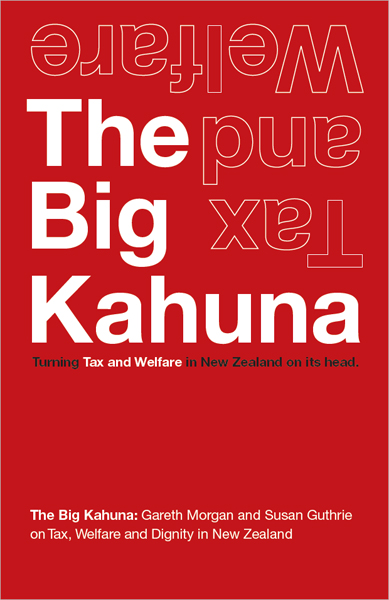Gareth Morgan and Susan Guthrie, Authors of The Big Kahuna
We’re pleased that Damien Grant read The Big Kahuna and found it worth the price of admission. And we welcome debate about the proposals we tabled in that book. But we draw the line at having our policies misreported.
We deliberately took the approach in the Big Kahuna of analysing tax and welfare together – because it is how these policies interact that determines the effect on individuals and the economy as a whole. Looking at tax or welfare in isolation is to see only part of the picture, but unfortunately this is a trap Mr Grant appears to have fallen into.
He asserts that we propose ‘staggering tax increases imposed on those remaining in employment.’ We don’t propose a ‘staggering tax increase’ on working people at all.
The combination of a UBI (of $11,000) with a flat tax rate of 30 per cent would leave anyone who simply earns a wage better off in net income terms than they are now (depending on their circumstances, the gain can be as much as 28 per cent).
For those who earn high wages (perhaps the radiographers Mr Grant had in mind), every additional dollar earned would be taxed at 30 per cent, not 33 per cent as at present. The impression Mr Grant gave that the policy leaves working people worse off, and removes the incentives for those with skills to work more, was quite wrong. One questions why he leapt to the conclusion.
The key thrust of our tax policy is – not as Mr Grant would have it, namely to penalise those who work hard for a high wage – but to change how people choose to invest their wealth and to ensure that we deliver on the existing commitment to redistribute wealth within the community (the only rationale for the current system of progressive taxes).
Our tax proposal has one effect on the high fliers Mr Grant is most concerned about – and indeed, anyone with wealth. It encourages them to invest their wealth in areas other than housing, land and unproductive businesses.
These investments would become less attractive than they are now – not because we have targeted them for special tax treatment, but because we have removed the loopholes that currently exist. With the exception of sole parents and retirees (whose situation we address with complementary policies) the only people who are adversely affected by our proposals are those who persist in placing very large amounts of wealth in housing, land and unproductive businesses.
Under the proposals put forward in the Big Kahuna, if people choose to use their savings for lifestyle purposes or to capture capital gains, that’s fine – they still can – but we’re no longer incentivising that activity by providing gaping tax loopholes for them to exploit. Instead, they will pay the full cost of those choices by contributing tax equal to that which the assets would generate if they were productively employed elsewhere in the economy. ‘Hurt[ing] the most productive members of the community’? – Hardly. Treating them as we do everyone else? Yes, and no apologies for it.
Mr Grant says we cannot ‘afford’ the UBI. On what basis he concludes that – apart from judging the current system as the “norm” – is unclear. Suffice it to say, Scandinavian countries for example transfer a lot more wealth per annum than we’re contemplating.
When it comes to Mr Grant’s views on the contribution unskilled workers make to our economy and society, we couldn’t disagree more. Far from being economically “irrelevant” minimum wage workers are the mainstay of many important industries and do very valuable work – caring for our institutionalised elderly is one example that comes to mind, tourism is another.
Volunteers and other unpaid workers make an important contribution in areas that may be less visible, but the contribution is there all the same (New Zealand has one of the highest rates of unpaid work in the OECD).
We’re sure the many thousands of people doing unpaid work, or working for a minimum wage, without whose work the economy would collapse, would be thrilled to see that Mr Grant values their contribution at not one jot. A ‘talentless’ ‘commodity’ these people are not. Ignored and undervalued – yes.
It may well be that we and Mr Grant differ in terms of the society we want to live in. That is a valid debate which goes beyond sparring over facts. The Big Kahuna was designed to deliver on a goal common to many modern Western societies – namely to minimise social alienation and provide all with the opportunity to participate in society. That goal may not be shared by all in this country, but that is a debate we have yet to have.
There is absolutely no question this country has enough income to effect a meaningful redistribution regime. The only barrier is that of conservative thinking that makes people allergic to change, deluded into accepting that the status quo – simply because it is the status quo – is optimal. We know it’s not.


